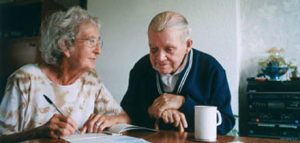‘We had no choice’: number of elderly filial carers on the rise in UK
For more than a decade, 71-year-old Harry Seymour has been the sole carer for his 106-year-old mother, Edith. Divorced and childless, Seymour moved in with his mother in 2005. Four years later, she was diagnosed with dementia.
“I didn’t expect to be my mother’s carer at all, and certainly not at the age I am now,†he said, “but there was no choice. We were a very close family but they’re all dead now. I don’t consider that I’ve sacrificed the years I’ve spent looking after mum though; it’s the natural thing to do.â€
The number of centenarians in the UK has quadrupled in the past 30 years, according to the latest figures from the Office for National Statistics. In the past decade alone, the number of people reaching the age of 100 has increased by 71%. The number of people over 90 has nearly trebled over the past 30 years.
The rise means there are increasing numbers of very old people being cared for by their children – themselves at an age at which they might have expected to be cared for, rather than to care for others.
Elderly filial carers are an under-researched group, but academics at University College London studying the over-50 population of England have found evidence that about one in 20 of those aged over 50 are caring for a grandparent, parent or parent-in-law.
According to separate research by Age UK, a third of the UK’s 6 million carers are aged 65 and over, and the number of carers aged 75 and over has increased by 35% since 2001. Over the past seven years, the number of carers aged 80 and over has increased from 300,000 to 417,000 – and continues to rise, the study found.
Dr Alisoun Milne, a professor in social gerontology and social work at the University of Kent, said elderly filial carers were a growing but under-recognised group. “Elderly, frail sons and daughters looking after very elderly and very frail parents are a neglected cohort,†she said. “But it’s crucial that we start to find out more about them, otherwise their distinctive needs won’t be met and both child and parent will end up in crisis.â€
Louise Mark, an older carers policy officer for the Carers Trust, agreed. “This is the new sandwich generation: elderly ‘children’ who might still be both paying for their own children to go through university and their mortgages, but having to take early retirement to care for parents in their 90s and older.â€
Dr Debora Price, the director of the Manchester Institute for Collaborative Research on Ageing at the University of Manchester, said: “This phenomenon is likely to grow, and of course as these carers age, they also become more likely to have a spouse who may need care, or to start to encounter health problems themselves.
“And while they are still relatively young, they also face competing pressures to continue in the paid workforce under the government’s extending working lives agenda and with rises in the state pension age. But they are also expected to – and do – care for their grandchildren.â€
Price points to research (pdf) showing that eight out of 10 grandmothers in England with a grandchild under 16 provide childcare. At the same time, 28% of grandparents with a grandchild under 16 have a parent who is still alive. “As those parents age, their needs potentially become greater,†Price said. “At the same time, their children – already grandparents – are ageing too, while also being expected to work and save.â€
Jo Moriarty, a senior research fellow and deputy director at the Social Care Workforce Research Unit at King’s College London, has begun researching this group. She said she recently met a woman in her 70s who was developing dementia while struggling to care for her mother, who had had dementia for years.
“Support for carers is predicated on carers not having health problems of their own,†she said. “There’s a lot of unintentional discrimination against older carers, even though they need more help than younger carers.â€
